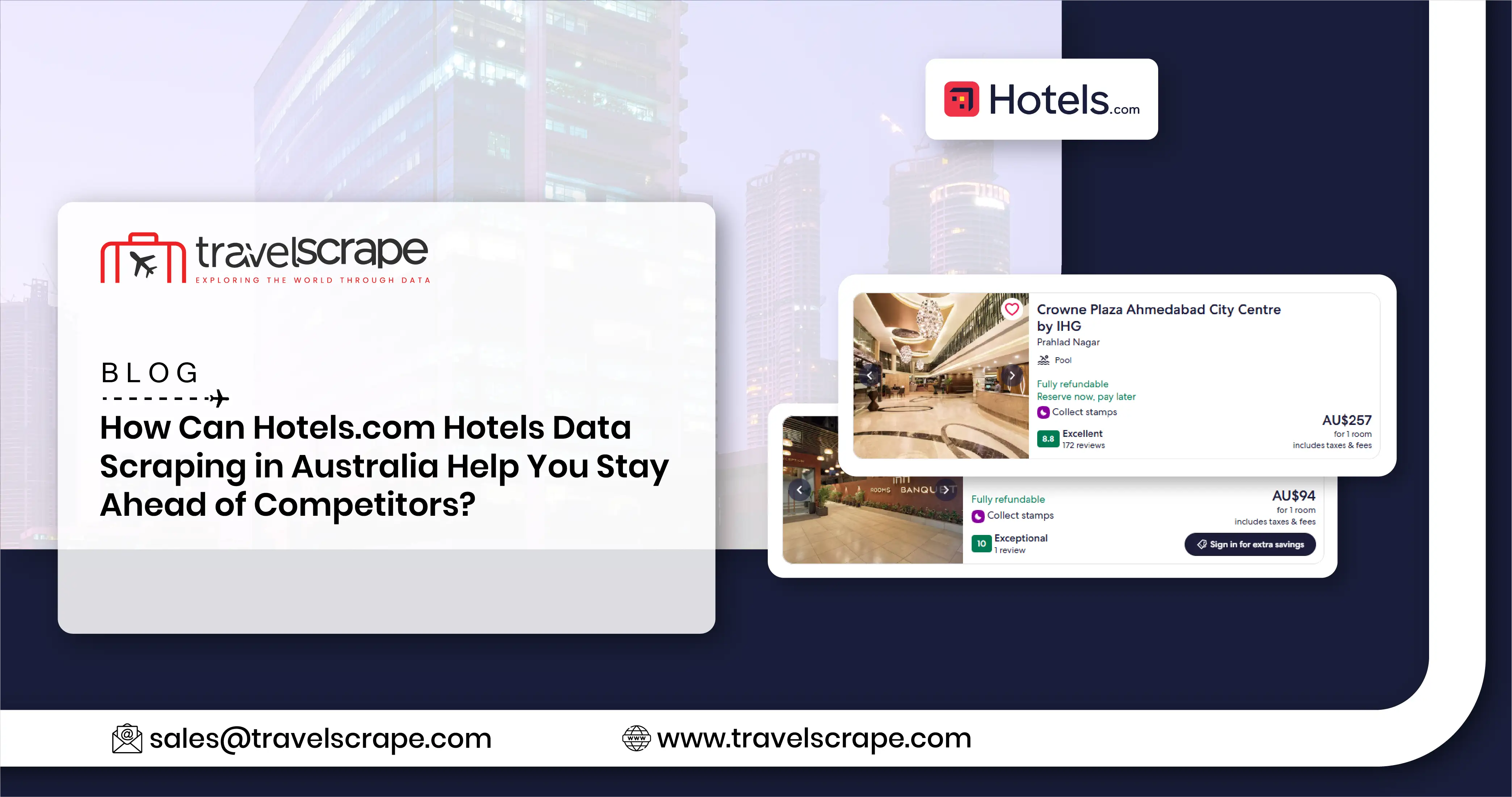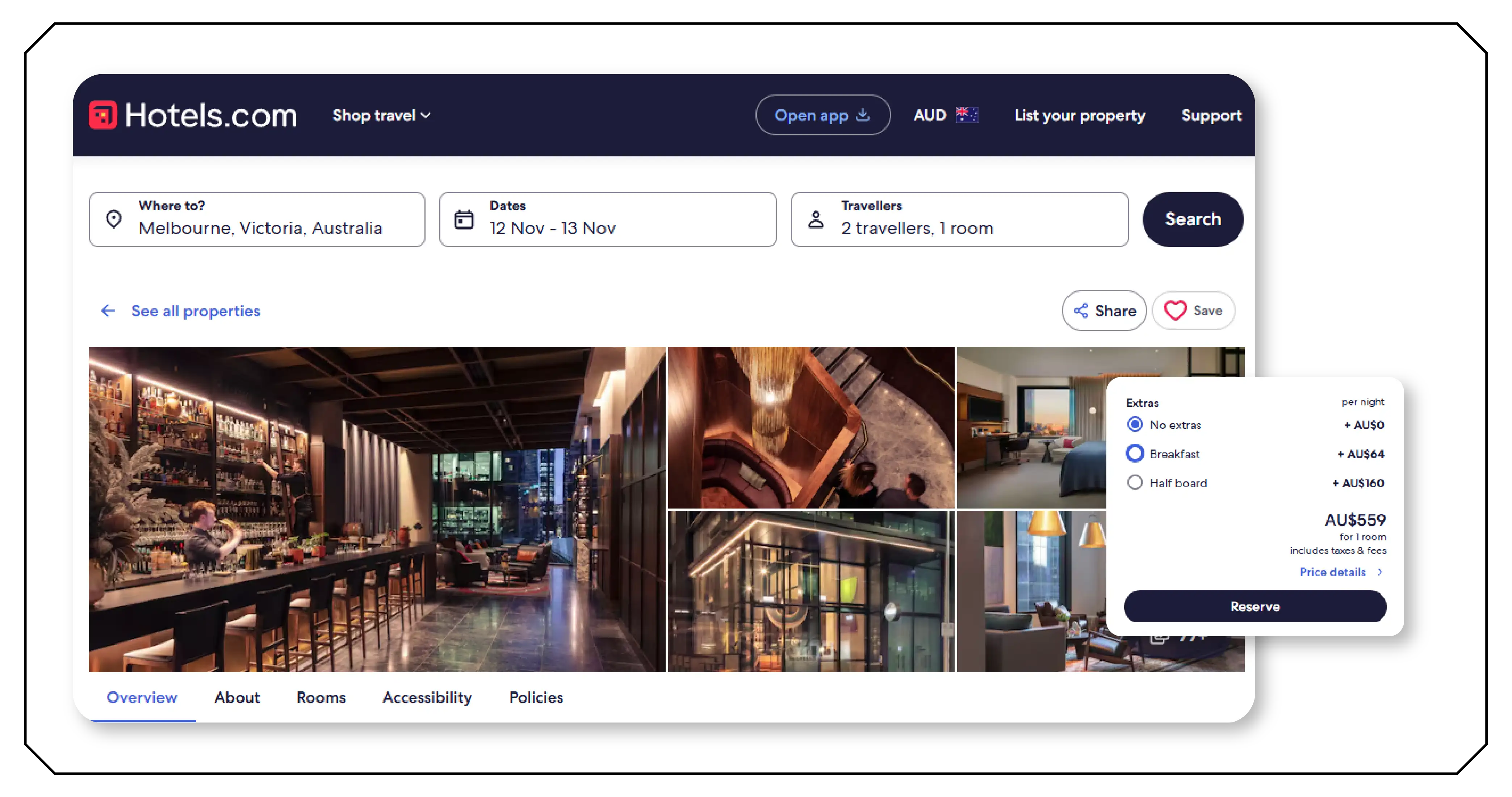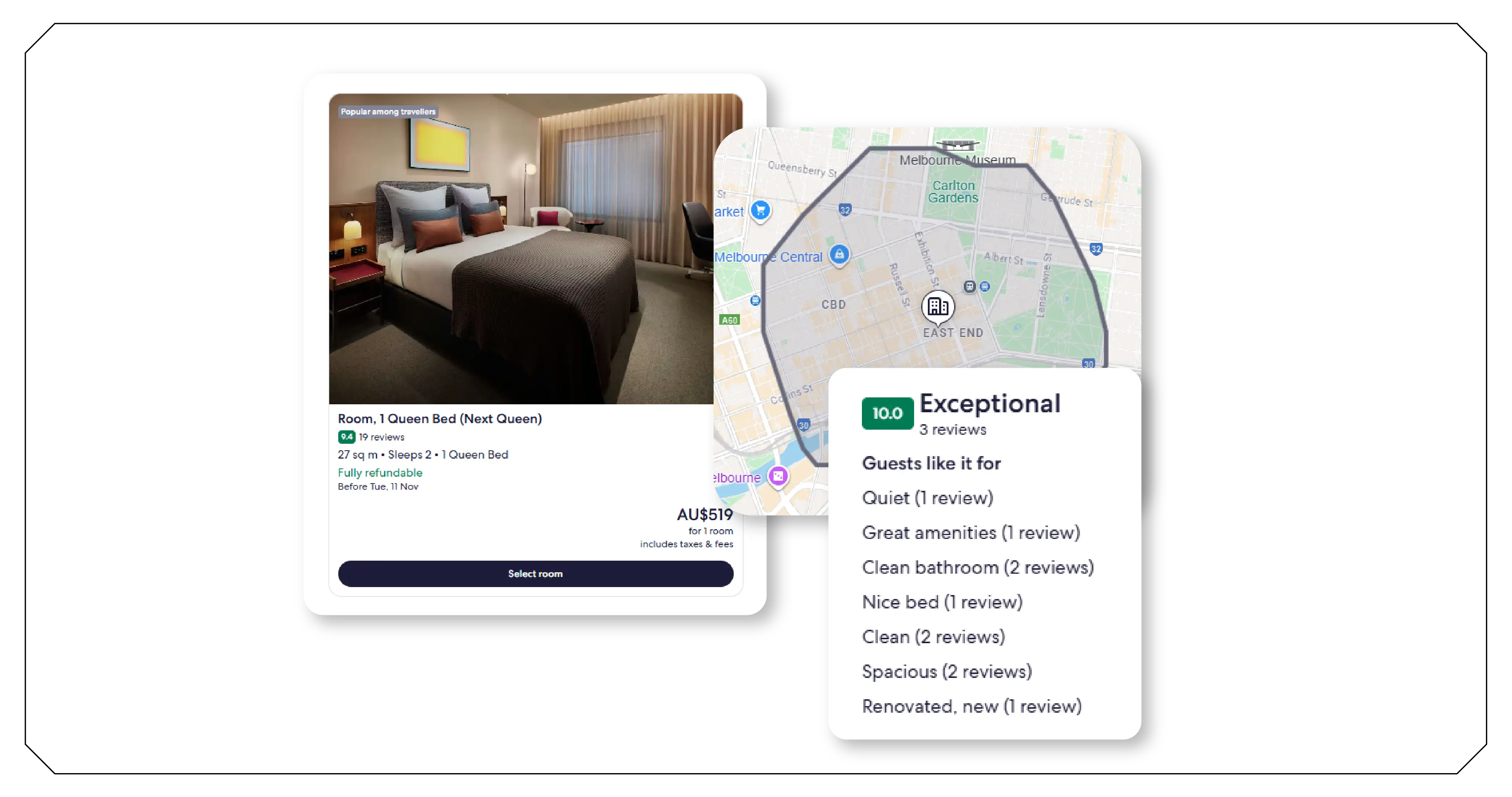How Can Hotels.com Hotels Data Scraping in Australia Help You Stay Ahead of Competitors?

Introduction
In the competitive landscape of online travel booking, data is the new currency. The ability to access real-time information about hotels, pricing, availability, and customer sentiment has become crucial for businesses aiming to make informed decisions. Hotels.com Hotels Data scraping in Australia provides an advanced and automated way to gather valuable hospitality insights from one of the world’s leading booking platforms. Through precise data extraction methods, businesses can analyze the changing patterns of hotel demand, occupancy rates, and customer reviews across cities such as Sydney, Melbourne, Brisbane, Perth, and Adelaide.
The travel and hospitality industry is highly data-driven, and Hotel Data Scraping Services play a pivotal role in bridging the gap between raw online information and actionable business intelligence. Whether it’s for travel agencies, hotel chains, tourism boards, or market researchers, the data extracted from Hotels.com allows decision-makers to uncover competitive pricing trends, guest preferences, and occupancy analytics that would otherwise remain hidden in static websites.
With an increasing number of travelers relying on online platforms for hotel booking, the need to Scrape Hotels.com Hotel Data Australia for Market Insights has become a strategic approach for brands looking to stay competitive. The data gathered through structured web scraping helps companies compare prices, analyze seasonal demands, monitor competitor listings, and optimize their promotional campaigns accordingly.
Why Hotels.com Data Matters in the Australian Hospitality Landscape?

Australia is one of the world’s most dynamic tourism destinations, attracting millions of domestic and international visitors every year. Cities like Sydney and Melbourne are not just leisure destinations but also major hubs for corporate travel, conventions, and events. The tourism industry’s rapid digitization has turned data from booking platforms like Hotels.com into a vital business asset.
Hotels.com offers vast amounts of structured and unstructured data—from room descriptions and photos to amenities, user ratings, and cancellation policies. Through Hotel Data Intelligence, organizations can decode consumer preferences, track competitor pricing strategies, and understand which regions are experiencing demand surges. This intelligence enables stakeholders to create data-backed marketing strategies, dynamic pricing algorithms, and targeted promotions based on real-time booking behaviors.
For instance, a hotel chain in Sydney could use scraping insights to identify when nearby competitors lower their rates during off-peak periods or when high occupancy in certain neighborhoods drives price hikes. Such knowledge gives them the ability to adjust pricing strategies instantly, ensuring competitiveness while maximizing revenue.
The Process: How Hotels.com Data Scraping Works
Web scraping from Hotels.com involves using automated software tools that extract structured data from the website’s pages without manual effort. These tools can be customized to target specific parameters like hotel name, star rating, amenities, room types, pricing, reviews, and booking availability. The extracted data can then be organized into datasets or dashboards for analysis and visualization.
Here’s a Simplified Workflow
- URL Identification: The scraper identifies the URLs containing relevant hotel listings across Australian regions.
- HTML Parsing: The code inspects the page structure and extracts key data fields.
- Data Extraction: Details like hotel names, pricing, guest reviews, star ratings, and amenities are collected.
- Data Cleaning: The collected data is refined, deduplicated, and structured into usable formats.
- Storage and Analysis: Data is stored in databases or cloud platforms for deeper analytics.
Through the process to Scrape Australia Hotels.com Hotel Prices and Availability, travel companies can gain a live view of rate fluctuations and room stock changes across different dates or seasons. This real-time visibility allows for adaptive pricing models and intelligent forecasting.
Applications of Hotels.com Data Scraping

1. Competitive Price Monitoring:
Hotels, OTAs, and
travel
management companies can use Hotels.com data to benchmark their pricing strategies.
Real-time data helps identify underpriced or overpriced listings relative to competitors
in the same location or star category.
2. Demand Forecasting:
Scraped data enables businesses
to
predict demand trends by analyzing booking frequency, review patterns, and occupancy
changes. This allows companies to adjust marketing campaigns or room inventory in
advance.
3. Customer Sentiment Analysis:
By examining reviews and
ratings, businesses can extract valuable insights into guest satisfaction levels and
service quality expectations. Through the methods to Extract Real-Time Hotels.com Hotel
Ratings Australia, companies can continuously monitor and evaluate the evolving
perception of their brand in the market.
4. Market Segmentation:
Hotels.com data helps segment the
market based on customer behavior—such as family bookings, solo travelers, business
guests, or international tourists. This segmentation aids in customizing offers and
improving targeting.
5. Performance Benchmarking:
Hotels can use extracted data
to measure their performance against industry benchmarks and identify areas of
improvement.
Understanding the Data Points
When performing Web Scraping Hotels.com Hotels Data, the data collected usually includes the following fields:
- Hotel Name and ID: Unique identifiers that allow mapping and cross-referencing with other datasets.
- Location Data: City, region, and geocoordinates for mapping competitive density.
- Room Rates and Availability: Price variations across different timeframes and room types.
- Amenities and Features: Data on in-room facilities, Wi-Fi availability, and breakfast options.
- Star Ratings and Guest Scores: Key indicators of reputation and customer satisfaction.
- Review Content and Sentiments: Insights into guest experiences and service feedback.
- Cancellation and Refund Policies: Information crucial for travelers and businesses analyzing flexibility trends.
Through such granular details, organizations can derive deeper insights about operational trends and guest expectations in specific regions of Australia.
Real-Time Benefits of Hotels.com Data Scraping
- Dynamic Pricing Intelligence: Scraping live data enables businesses to monitor how competitor rates fluctuate by date, season, or event. This empowers them to dynamically adjust prices, stay competitive, and maintain optimal occupancy levels.
- Market Expansion and Targeting: Data insights help identify emerging travel hotspots within Australia, such as growing suburban or coastal regions that are seeing increased booking activity.
- Product Optimization: Hotels can use feedback analysis to modify amenities or services that consistently appear in negative reviews, improving guest satisfaction scores.
- Revenue Management Automation: With consistent datasets, businesses can automate revenue management systems, enabling real-time decisions on discounts or premium pricing during high demand.
- Investment Decision Support: Developers and investors can evaluate which regions or hotel categories (budget, mid-range, luxury) show the highest occupancy rates and potential profitability.
Scraping Reviews and Feedback for Sentiment Analysis
Customer reviews on Hotels.com represent a treasure trove of authentic feedback that shapes a hotel’s online reputation. By Scraping Hotels.com Australia Hotel Reviews and Booking Data, businesses can identify patterns in guest experiences—both positive and negative.
Natural Language Processing (NLP) models can analyze the language and tone of reviews to determine sentiment trends. For instance, frequent mentions of “clean rooms” or “great location” highlight strengths, while repeated mentions of “poor Wi-Fi” or “noisy nights” indicate improvement areas.
The creation of a Hotels.com Guest Reviews Dataset enables data scientists to visualize customer satisfaction trends over time, across different properties, and by traveler type. It also helps identify the most common complaints or compliments for specific hotel chains or regions, informing quality control and marketing messaging.
Business Sectors Benefiting from Hotels.com Data
1. Travel Aggregators:
Travel portals and comparison sites
can use scraped data to display competitive pricing and availability insights, improving
transparency for their users.
2. Hotel Chains and Independent Properties:
Data helps them
benchmark performance and refine marketing campaigns based on real-time competitor data.
3. Tourism Boards and Market Researchers:
Government
tourism departments and research firms can assess travel trends, accommodation demand,
and average room rates to support policy and development.
4. Investment Firms:
By analyzing hotel occupancy and
pricing trends, investors can identify high-performing regions for hospitality
development.
5. Travel Technology Startups:
They can use this data to
build advanced AI-based hotel recommendation engines, dynamic pricing solutions, or
custom booking systems.
Ethical and Legal Considerations
While Hotels.com data scraping is technically feasible, it must be carried out ethically and responsibly. Organizations should respect the platform’s robots.txt directives, data ownership rights, and comply with regional data protection laws. Employing professional data scraping providers ensures that the process remains compliant and non-intrusive, maintaining the integrity of both the source website and the data consumer.
Moreover, anonymizing collected data and avoiding personal or sensitive information is essential to maintain transparency and trust.
Case Example: How Hotels.com Data Drives Market Strategy
Let’s consider a hypothetical example of an Australian travel startup aiming to optimize its hotel recommendation platform. Using a scraping API, the startup collects thousands of Hotels.com listings across major cities. It then applies analytics to determine:
- Which hotels have the best rating-to-price ratio.
- Which locations show rising booking trends in Q2.
- Which amenities are most frequently associated with higher ratings.
Armed with this information, the startup creates a user-facing feature recommending “Best Value Hotels in Sydney for Business Travelers” or “Top Coastal Hotels for Summer Vacations.” This not only enhances the user experience but also builds brand credibility by offering data-backed suggestions.
Technical Aspects of Hotels.com Data Scraping
To ensure successful scraping, specialized tools and frameworks are used—such as Python-based scrapers with libraries like BeautifulSoup, Scrapy, and Selenium. These enable automated extraction from dynamic web pages, ensuring structured results even when the website uses JavaScript-based content.
Cloud-based scraping solutions can further streamline operations by managing proxy rotation, captcha solving, and large-scale data extraction. For companies seeking reliability and scalability, outsourcing to a professional data scraping partner provides end-to-end support, including maintenance and API integration.
Challenges and Solutions
1. Anti-Bot Measures: Hotels.com employs sophisticated anti-bot technologies. Using rotating proxies and headless browsers can overcome these restrictions responsibly.
2. Dynamic Web Content: Some listings are loaded asynchronously. Using modern frameworks like Puppeteer or Selenium ensures the complete rendering of content before extraction.
3. Data Normalization: Different listings might display inconsistent formats. Cleaning and standardizing data is crucial for accurate analysis.
4. Scalability: Large-scale scraping requires distributed systems that handle concurrent requests while maintaining accuracy and speed.
5. Compliance: Working within legal frameworks and using authorized APIs ensures sustainable operations and data accuracy.
Future of Data Intelligence in Hospitality
The Australian hospitality industry is moving toward AI-powered analytics and predictive modeling. The data scraped from Hotels.com feeds machine learning systems that can forecast demand, suggest dynamic rates, and predict customer preferences. The fusion of real-time data with predictive intelligence will shape the future of hotel management and distribution strategies.
Travel agencies and hotel groups leveraging these capabilities will find themselves well-positioned to anticipate market movements and align their business decisions with evolving traveler behavior.
How Travel Scrape Can Help You?
1. Gain a Competitive Edge:
Our services help you track
competitors’ room rates, offers, and promotions in real time, enabling you to adjust
pricing strategies proactively and maintain a strong position in the hospitality
marketplace.
2. Access Actionable Market Insights:
We provide accurate
and up-to-date information on hotel trends, customer preferences, and seasonal booking
patterns, helping you make data-backed business decisions that drive growth and enhance
operational efficiency.
3. Improve Customer Experience:
By analyzing guest reviews
and feedback, you can identify key service gaps, refine your offerings, and build
stronger relationships with travelers through improved quality, comfort, and
personalized experiences.
4. Optimize Rate and Inventory Management:
Our solutions
allow you to monitor price changes and room availability across multiple platforms,
ensuring your listings remain competitive, accurate, and aligned with market demand at
all times.
5. Build Custom Analytical Dashboards:
We deliver
structured datasets that can be integrated into your internal systems, helping you
visualize trends, benchmark performance, and forecast future demand through real-time
analytical dashboards.
Conclusion
Hotels.com remains a key data source for understanding the ever-changing Australian hospitality sector. By analyzing live pricing, occupancy patterns, and guest sentiments, businesses gain unparalleled visibility into market shifts and consumer expectations. Web Scraping Hotels.com Australia Hotel Market Price Trends provides real-time insights that empower hotels, travel agencies, and data analysts to refine strategies and maximize revenue potential.
For organizations seeking a more structured and scalable approach, the process to Extract Hotels.com Hotel Listings Australia via API offers seamless integration of live hotel data into analytics systems, dashboards, and pricing tools. When paired with a comprehensive Hotels.com Hotel Room Rates Dataset , businesses can monitor pricing evolution, assess competitive positioning, and forecast demand with unmatched accuracy.
In summary, Hotels.com data scraping in Australia is not just a technological advantage—it is a strategic necessity. The intelligence derived from these datasets helps the travel ecosystem operate with clarity, precision, and agility in an increasingly data-driven world.
Case Example: How Hotels.com Data Drives Market Strategy
Let’s consider a hypothetical example of an Australian travel startup aiming to optimize its hotel recommendation platform. Using a scraping API, the startup collects thousands of Hotels.com listings across major cities. It then applies analytics to determine:
- Which hotels have the best rating-to-price ratio.
- Which locations show rising booking trends in Q2.
- Which amenities are most frequently associated with higher ratings.
Armed with this information, the startup creates a user-facing feature recommending “Best Value Hotels in Sydney for Business Travelers” or “Top Coastal Hotels for Summer Vacations.” This not only enhances the user experience but also builds brand credibility by offering data-backed suggestions.
Technical Aspects of Hotels.com Data Scraping
To ensure successful scraping, specialized tools and frameworks are used—such as Python-based scrapers with libraries like BeautifulSoup, Scrapy, and Selenium. These enable automated extraction from dynamic web pages, ensuring structured results even when the website uses JavaScript-based content.
Cloud-based scraping solutions can further streamline operations by managing proxy rotation, captcha solving, and large-scale data extraction. For companies seeking reliability and scalability, outsourcing to a professional data scraping partner provides end-to-end support, including maintenance and API integration.
Challenges and Solutions
1. Anti-Bot Measures: Hotels.com employs sophisticated anti-bot technologies. Using rotating proxies and headless browsers can overcome these restrictions responsibly.
2. Dynamic Web Content: Some listings are loaded asynchronously. Using modern frameworks like Puppeteer or Selenium ensures the complete rendering of content before extraction.
3. Data Normalization: Different listings might display inconsistent formats. Cleaning and standardizing data is crucial for accurate analysis.
4. Scalability: Large-scale scraping requires distributed systems that handle concurrent requests while maintaining accuracy and speed.
5. Compliance: Working within legal frameworks and using authorized APIs ensures sustainable operations and data accuracy.
Future of Data Intelligence in Hospitality
The Australian hospitality industry is moving toward AI-powered analytics and predictive modeling. The data scraped from Hotels.com feeds machine learning systems that can forecast demand, suggest dynamic rates, and predict customer preferences. The fusion of real-time data with predictive intelligence will shape the future of hotel management and distribution strategies.
Travel agencies and hotel groups leveraging these capabilities will find themselves well-positioned to anticipate market movements and align their business decisions with evolving traveler behavior.
How Travel Scrape Can Help You?
1. Gain a Competitive Edge:
Our services help you track
competitors’ room rates, offers, and promotions in real time, enabling you to adjust
pricing strategies proactively and maintain a strong position in the hospitality
marketplace.
2. Access Actionable Market Insights:
We provide accurate
and up-to-date information on hotel trends, customer preferences, and seasonal booking
patterns, helping you make data-backed business decisions that drive growth and enhance
operational efficiency.
3. Improve Customer Experience:
By analyzing guest reviews
and feedback, you can identify key service gaps, refine your offerings, and build
stronger relationships with travelers through improved quality, comfort, and
personalized experiences.
4. Optimize Rate and Inventory Management:
Our solutions
allow you to monitor price changes and room availability across multiple platforms,
ensuring your listings remain competitive, accurate, and aligned with market demand at
all times.
5. Build Custom Analytical Dashboards:
We deliver
structured datasets that can be integrated into your internal systems, helping you
visualize trends, benchmark performance, and forecast future demand through real-time
analytical dashboards.
Conclusion
Hotels.com remains a key data source for understanding the ever-changing Australian hospitality sector. By analyzing live pricing, occupancy patterns, and guest sentiments, businesses gain unparalleled visibility into market shifts and consumer expectations. Web Scraping Hotels.com Australia Hotel Market Price Trends provides real-time insights that empower hotels, travel agencies, and data analysts to refine strategies and maximize revenue potential.
For organizations seeking a more structured and scalable approach, the process to Extract Hotels.com Hotel Listings Australia via API offers seamless integration of live hotel data into analytics systems, dashboards, and pricing tools. When paired with a comprehensive Hotels.com Hotel Room Rates Dataset, businesses can monitor pricing evolution, assess competitive positioning, and forecast demand with unmatched accuracy.
In summary, Hotels.com data scraping in Australia is not just a technological advantage—it is a strategic necessity. The intelligence derived from these datasets helps the travel ecosystem operate with clarity, precision, and agility in an increasingly data-driven world.
Ready to elevate your travel business with cutting-edge data insights? Scrape Aggregated Flight Fares to identify competitive rates and optimize your revenue strategies efficiently. Discover emerging opportunities with tools to Extract Travel Website Data, leveraging comprehensive data to forecast market shifts and enhance your service offerings. Real-Time Travel App Data Scraping Services helps stay ahead of competitors, gaining instant insights into bookings, promotions, and customer behavior across multiple platforms. Get in touch with Travel Scrape today to explore how our end-to-end data solutions can uncover new revenue streams, enhance your offerings, and strengthen your competitive edge in the travel market.